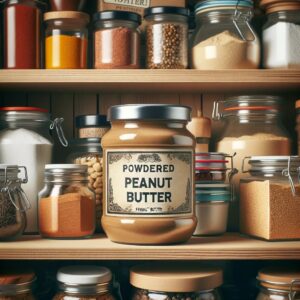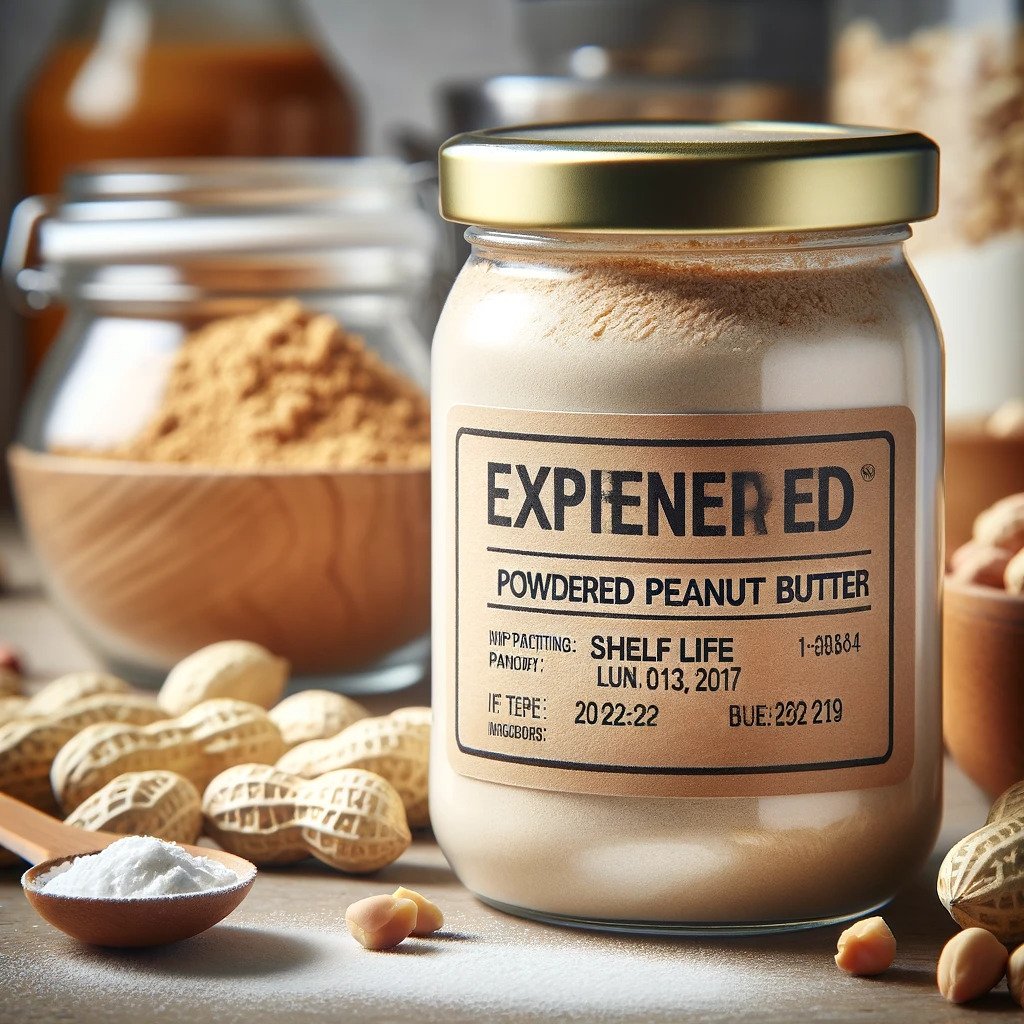Embarking on a culinary journey with Peanut butter powder has revolutionized the way we make our everyday meals and snacks. This nutritious and delicious addition brings a unique and flavorful twist to traditional cooking and baking. As someone who relishes creating quick and inventive dishes, I’ve found that incorporating this food into my kitchen has elevated the experience of both preparation and consumption. However, it intrigues how long does powdered peanut butter last? Lets check this out.
What Is Powdered Peanut Butter?
Powdered peanut butter is a nutritional powerhouse, a byproduct of peanuts that are roasted and pressed. This process efficiently removes most of the oil, leaving behind the remaining particles. These are then ground into a fine powder, often with small amounts of sugar and salt added to enhance the flavor. Some variations include flavor additives like chocolate, or nutritional boosters such as chia seeds and probiotics, resulting in a concentrated product with an intense taste.
This dehydrated product can either be used as-is or rehydrated with water to form a paste, similar to traditional peanut butter but with a distinct texture and taste. As an avid home cook, I’ve found that its versatility extends beyond just being a protein supplement; it’s an additive that commercially revolutionizes the way we approach cooking and baking. When stored properly in a cool, dry place, its shelf life is remarkably extended, maintaining its quality and taste for months.
Can I Make My Own Peanut Butter Powder?
Absolutely! Making your own peanut butter powder at home is not only feasible but can also be a healthier, more customized alternative to store-bought brands. You can start by selecting unsalted peanuts, which offer a more natural taste and fewer additives. Using a food processor, blend the peanuts on high speed until they reach a completely smooth consistency. This homemade approach allows you to have control over the flavours and sweetness level, enabling you to add extra ingredients like cinnamon or cocoa powder for a unique twist.
Once your peanuts are finely ground, you can transfer them back into the food processor and sprinkle in a powdered sweetener of your choice, adjusting to your desired taste. The beauty of this process lies in its simplicity and the bonus of creating a homemade product that’s free from commercial preservatives and excessive salt. For those who worry about the additives in commercial products, this salt-free option is a great solution.
When stored properly in a cool, dry place, your Powder Peanut Butter can last for a considerable amount of time, retaining its freshness and nutritional value. This DIY method not only provides a spread that’s tailored to your taste but also an assurance of a healthier form of this beloved staple. Whether you’re looking to buy fewer processed foods or just enjoy the process of making your own pantry items, creating powdered peanut butter at home is a rewarding endeavor.
How Long Does Powdered Peanut Butter Last?
Powdered peanut butter, much like powdered milk and powdered eggs, boasts a significantly longer shelf life compared to its traditional counterpart, standard peanut butter. This extended longevity is primarily due to the reduced oil content, which makes it harder for the product to spoil. Unlike regular peanut butter, where the presence of oils can lead to quicker spoilage, the dry nature of powdered peanut butter offers a more stable shelf life.
The Impact of Brand and Storage on Longevity
Furthermore, the shelf life of powdered peanut butter can vary depending on the brand. Most brands assure a remarkable shelf life of 5-20 years, thanks largely to the stable nature of peanut protein when processed into a powder form. This extensive range in shelf life makes it an ideal choice for long-term storage, emergency food supplies, or simply as a convenient, long-lasting pantry staple. Proper storage, away from moisture and heat, further ensures that your powdered peanut butter remains fresh and usable for years to come.
Is peanut butter powder good for you?
Peanut butter powder is not just a pantry staple; it’s a trove of valuable nutrients. It’s a good source of plant-based protein, essential for those looking to maintain or increase their protein intake. Its high protein content also fills you up quickly, making it an excellent snack choice.
Additionally, peanut butter powder is rich in healthy fats, notably monounsaturated fats, known to lower cholesterol levels and support heart health. For those mindful of their blood sugar, this powder, especially when unsweetened, has a low glycemic index, helping to prevent rapid spikes in blood sugar levels.
Nutritional Benefits and Versatility in Use
Aside from protein and fats, it contains vitamins and minerals like zinc and magnesium, which are crucial for normal cognitive functioning and to reduce fatigue. The presence of dietary fibre, antioxidants, and phytochemicals further amplifies its health credentials. Whether you’re blending it into smoothies, sprinkling it on fruits, or combining it with vegetables, its versatility is unmatched.
And for those who like a bit of flavor, prepared versions flavoured with natural sweeteners like honey or agave nectar offer a delightful taste without compromising on health.
Impact on Weight Management and Overall Health
In terms of overall wellness, regular consumption of peanut butter powder can contribute to weight loss, improved heart health, and better digestion. These health benefits are amplified when you choose a product with minimal salt and sweeteners, ensuring you get the most out of this nutritious food. So, whether you’re using it as a standalone snack or as a component in various dishes, peanut butter powder stands out as a nutritious, health-boosting food option.
Should I refrigerate powdered peanut butter?
Powdered peanut butter is inherently a shelf-stable product, designed to last between 1-2 years without spoiling or going bad. This impressive shelf life stems from its low moisture content, which significantly slows down the spoiling process. Unlike traditional peanut butter, it does not require refrigeration to maintain its quality over time. However, if you’ve already prepared a batch of peanut butter from the powder, storing it in a sealed container in the refrigerator can help preserve its optimal freshness and flavour.
Maximizing Taste and Texture
For those who value the highest quality of taste and texture in their peanut butter, refrigerating the prepared powder can make a noticeable difference. Keeping it chilled, especially in a refrigerator, guards against the negative effects of heat and light, which can make the powder less flavorful and lose its characteristic crunchiness. It’s a simple yet effective way to ensure that every spread offers the full, rich flavor that peanut butter enthusiasts love.
Understanding the Impact of Environmental Factors
The key to prolonging the life and quality of powdered peanut butter lies in understanding how environmental factors like heat and light can degrade its quality. Even though the powder is shelf-stable, prolonged exposure to these elements can diminish its taste and texture. By storing it in a cool, dark place – or in the refrigerator for prepared peanut butter – you can enjoy its deliciousness for as long as possible.
Is powdered peanut butter good for weight loss?
PB2, a popular brand of powdered peanut butter, has gained success in the health and wellness community, particularly for those pursuing weight loss. Its calorie content is significantly lower than regular peanut butter, boasting fewer than 45 calories per 15g (1 tablespoon) serving. This is in stark contrast to the 95-115 calories found in original or reduced-fat peanut butters. Such a drastic reduction in calories makes it an appealing alternative for calorie-conscious consumers.
Apart from being low in calories, PB2 is advantageous due to the loss of fat content and the lack of additives. The powder form of peanut butter is notably low in sodium and saturated fat, making it a healthier choice. For those trying to manage their sodium intake or reduce unhealthy fats in their diet, this makes PB2 a suitable option.
Additionally, as a product and additive to various recipes, powdered peanut butter allows individuals to enjoy the delicious, nutty flavour of peanut butter without the guilt of extra calories that could lead to weight gain. Its versatility in cooking and flavor-enhancing qualities make it a favorite among health enthusiasts and chefs alike.
Incorporating Powdered Peanut Butter in a Balanced Diet
For those considering swapping out their current nut butters for PB2, it could help reduce excess pounds from the waistline if used sparingly within a healthy balanced diet. It’s essential to remember that while PB2 is a healthier option due to its lower calorie and fat content, it should be integrated thoughtfully into one’s diet to maximize its benefits.
Conclusion
Powdered peanut butter offers an impressive shelf life, lasting between 1-2 years, making it a convenient and durable addition to any pantry. Its lower calorie and fat content, coupled with significant nutritional benefits, make it an excellent choice for those mindful of their health, especially in weight management.
While it thrives in shelf stability, taking extra steps, like storing it in a cool, dry place or refrigerating prepared mixes, can further ensure its longevity and preserve its quality. Whether used as a dietary supplement, a cooking ingredient, or a health-conscious alternative to traditional peanut butter, powdered peanut butter stands out as a versatile, long-lasting, and healthy food option.
Frequently asked questions
1.Can powdered peanut butter expire?
Yes, powdered peanut butter can expire. It typically has a shelf life of 1-2 years, but it’s essential to check the expiration date on the package for accuracy.
2.Is powdered peanut butter really healthy?
Powdered peanut butter is considered healthy due to its lower fat and calorie content compared to regular peanut butter, while still offering valuable nutrients like protein, vitamins, and minerals.
3.How long does peanut butter last in a packet?
Packaged peanut butter can last up to 1-2 years unopened. Once opened, it’s best consumed within a few months for optimal taste and quality.
4.Does peanut butter go bad after 2 years?
Peanut butter can go bad after 2 years, especially if it has been opened or improperly stored. It’s best to adhere to the expiration date and storage instructions.

